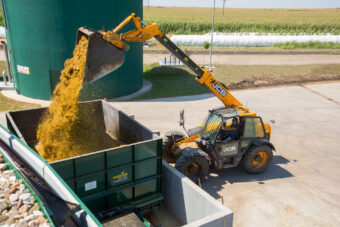
Considering the available energy sources and agricultural potential in Serbia, a total of 500 MW obtained from biogas can be achieved without any problems. Biogas power plants operate 24 hours a day, 7 days a week, providing energy stability and balance to the entire system. We talked with Lidija Carević from the Serbian Biogas Association about the current situation in our country regarding biogas, development potential, new technologies, and future plans.
EP: When was the Serbian Biogas Association founded?
Lidija Carević: The Serbian Biogas Association is a non-governmental and non-profit association founded in March 2012, when the three owners of the first biogas plants got together in an attempt to achieve the best possible business conditions in this sector. Today, the Association is a representative association that gathers about 50 members, biogas plants, and other institutions: equipment producers, a new line of investors in the biogas industry, universities, insurance companies, and consulting companies. In cooperation with domestic and international institutions, the Association is working intensively on the professional development of its members regarding using renewable energy sources and managing biogas plants. A special honor, but also an additional responsibility, was shown to us in 2020 when the Association got the approval from the Government to add the name of the Republic of Serbia to its name. Since August 2020, the Biogas Association has been called the Serbian Biogas Association.
In focus:
EP: What is biogas, and what is its potential in Serbia? Is biogas exploited enough?
Lidija Carević: Biogas represents a mixture of gases formed by the decomposition of organic matter in conditions without the presence of oxygen (anaerobic conditions). The formed mixture of gases mainly consists of methane (50-75 vol%) and carbon dioxide (25-50 vol%). In addition, biogas contains small amounts of hydrogen, hydrogen sulfide, ammonia, and other gases in traces. The process of biogas formation is similar to the process of digestion in the stomach of ruminants, and this process is called anaerobic digestion. Biogas is generated from liquid and solid animal manure, organic waste and/or energy crops in a technological process in a hermetically sealed tank. Biogas is produced efficiently under controlled conditions in plants called biogas power plants. Biogas can be used to produce electricity and heat (cooling) energy within the cogeneration plant (CHP), for combustion, i.e., heat production, as well as for the production of pure methane (enriched biogas).
As a notable fact, it is good to know that in the Republic of Serbia there is still no legislation for the production of pure methane from biogas. As part of the fermentation end process, a high-quality fertilizer was obtained, which is allowed in organic agriculture, so we can say this is a complete process. Serbia’s potential in biogas production is huge. Considering that Serbia is an agricultural country and as much as 65 per cent of the Serbian surface is arable land, we are talking about a large amount of waste from farms, i.e., raw materials used to obtain biogas. Annual biogas production in Serbia is about 256 GWh/g. Currently, as many as 34 biogas power plants are fully operational in Serbia. Given that we are a young market, this is an impressive figure. An indicator that the market is developing in the right direction is that we currently have as many as 81 plants in temporary status, which means that the sector will grow significantly in the next two to three years.

EP: How much are the citizens in Serbia aware of the biogas potential? What is the situation in terms of education?
Lidija Carević: We work on educating the decision-makers, farmers, future investors, and the general public. Our primary goal is to promote biogas and create an image of biogas as a form of green energy that is most benevolent to the environment and attract new investments in this sector. We in the Association have provided a whole set of educational materials, such as professional brochures, a film about biogas, education materials, and a guide for investors. All materials are published on our website, and we are happy to share all the necessary information with those interested. We are also actively promoting the construction of small biogas plants. Our message is that every village should have its biogas plant, primarily for environmental reasons. Our emphasis is on the fact that of all renewable energy sources, biogas has the most positive impact on the environment.
Interview by: Milica Radičević
Read the story in the new issue of the Energy portal Magazine RENEWABLE ENERGY SOURCES.

